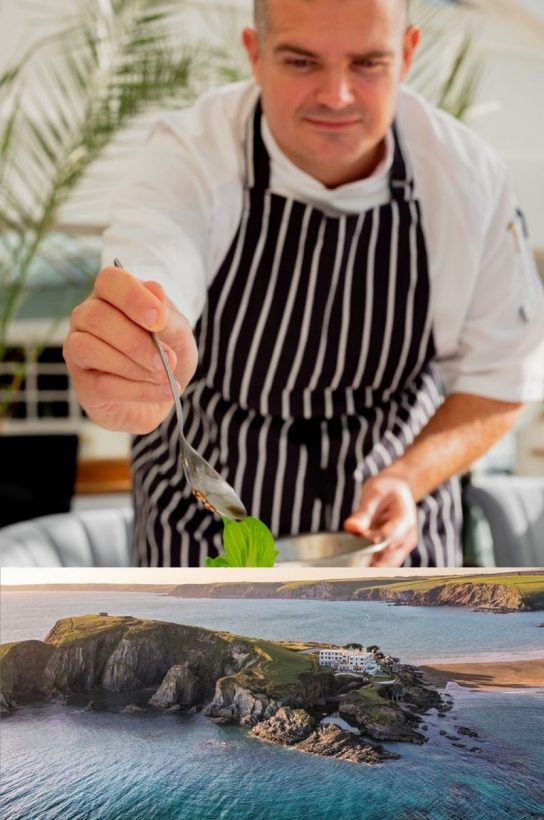CODE meets Tim Hall, Burgh Island Hotel
Published 3 February 2021

Running a restaurant on an island off the south coast of Devon presents its own unique challenges. This week, executive chef of Burgh Island Hotel Tim Hall shares what drew him to the island, tells us more about his sustainable ethos and discusses his cookbook with Burgh Island’s most notable dishes coming out this year.
Could you start by summing up Burgh Island Hotel in a couple of sentences?
Burgh Island is an iconic art deco hotel set on an island off the south coast of Devon. For me, it’s the home of so many interesting stories, and interesting characters too!
Tell us more about your ethos and the food you cook?
My cooking is guided by a couple of principles, the first being simply that I like cooking what I enjoy eating – and thankfully the diners on Burgh Island seem to enjoy my dishes too! Another general rule I always try to keep to is cooking as sustainably as possible. I’ve been fortunate enough to build great relationships with local suppliers during my 12 or 13 years at Burgh, which has been really beneficial for reducing the carbon footprint of our kitchen.
And where do you get the inspiration behind the dishes you cook?
I love picking up ideas from anywhere, whether it’s a particularly aesthetically pleasing picture of a dish on my Instagram feed, or a meal that makes a real impression on me when dining out (back when that was possible). Although inspiration can come from almost anywhere, I always like to put my own spin on dishes to provide something unique to Burgh Island, incorporating local plants such as sea beet, rock samphire, or some of the many herbs grown by our fantastic gardener, Apple. Developing dishes really is a collaborative effort, and it’s great to get all the guys in the kitchen involved too.
You place a large focus on sustainable cuisine. Why is this so important to you?
Sustainability is important for everyone. We all have a duty to lessen humans’ impact on our planet, and for chefs this means assessing where we can reduce waste in our kitchens. At Burgh Island, for example, we recently stopped buying orange juice and marmalade which came in plastic cartons and glass jars. Instead, we’ve invested in a good juicer, enabling us to make our own orange juice without the plastic packaging. We then recycle the peel to make our marmalade, so there’s zero waste and we’re saving money too.
And what would be the one piece of advice you’d give to other restaurateurs on making their restaurant more sustainable?
Even small changes can make a massive difference, so do whatever you can. It’s amazing what you can save when you look for every opportunity, which we started doing in our kitchen last year. When we realised just how much plastic we used cooking sous vide, we decided to place greater emphasis on more traditional methods. We’re also looking at getting a pergal fridge so we can order our milk in large boxes rather than four-pint cartoons, which use so much more plastic. Sometimes the initial outlay on new equipment may be off-putting but consider it an investment which will pay dividends for the planet.
You’ve worked on Burgh Island for almost 15 years. What drew you to the island?
This is actually my second spell on Burgh Island, after first arriving as a young pastry chef in my early twenties. It was the free spirit of the place which initially drew me, with the head chef Connor encouraging us all to experiment with dishes and express ourselves creatively, almost as if cooking were a hobby rather than a job. I’ve always tried to maintain that same spirit, and the owner, Giles, has been extremely supportive in that regard. He’s always been keen to invest in the kitchen and its staff, so much so that we’ve gone from having a single restaurant to having four different dining venues across the island.
What are the challenges involved with running a kitchen based offshore?
There are a few, as you might imagine! You have to plan ahead as far as possible and think on your feet if, for example, the sea tractor that ferries everyone and everything between the island and the mainland suddenly breaks down. At times like this, the togetherness within your team is vital because often the guys who have been working all day will have to work late to cover those who can’t get onto the island for their shift. We always try to make those experiences as enjoyable as possible, even on occasion celebrating with music and milkshakes after working in the kitchen until 1am – all worth it in the end.
With more and more people moving out of London, what impact will that have on dining outside of the capital?
Food in the regions will need to modernise to cater to the appetites people bring with them. For example, London is obviously a very multicultural place and that’s reflected in the many different types of food you can find there, so chefs outside the capital will need to expand their horizons. Obviously modern Britain cuisine, working with fresh produce, locally sourced fish and forage coastal herbs and plants is at the heart of our dining experience. But, I have actually just bought a book by a chef from Dishoom, which should provide some great inspiration for our kitchen.
You’re releasing a cookbook of your own soon filled with Burgh Island’s most-notable dishes. Tell us more about that?
It’s been a while in the making, but it really started in the first lockdown last year. Penny, MD of the company which helps run the hotel, encouraged me to do it as a celebration of my favourite dishes we’d made at Burgh Island in my time here. It also champions the ideas I like to cook with, prioritising sustainability and local produce. Even with all the spare time lockdown afforded me, it has still taken several months to finish, with the more intricate recipes taking as long as four hours to write. However, I’m excited to say it’s almost ready, and I can’t wait to share these recipes with everyone.
Finally, if you had to eat one meal for the rest of your life, what would it be?
I’d go for three courses, starting with scallops. I don’t mind what they’re served with, as long as there’s plenty of them. For main course, a hearty, old-fashioned favourite: braised beef cheek with colcannon and beef jus. And finally a simple but beautiful dessert of apple crumble with vanilla ice cream. That would do nicely!




